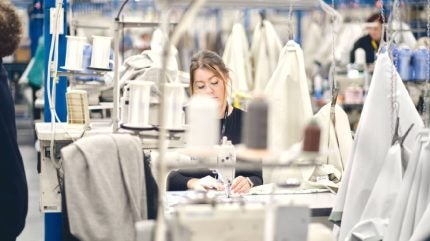
UK government statistics reveal that since the inception of the Level 2 Sewing Machinist Apprenticeship in 2018, only 130 individuals have embarked on the programme.
This figure is in contrast with the projected expansion of Europe’s secondhand goods sector, which is anticipated to balloon to £86bn ($117.06bn) over the next decade, according to Future Market Insights data.

Discover B2B Marketing That Performs
Combine business intelligence and editorial excellence to reach engaged professionals across 36 leading media platforms.
The expected apprentices for the programme were 450 in the first year alone in England, followed by 400 annually thereafter, according to UK Fashion and Textile Association (UKFT) skills and training director John West.
“The actual numbers fall way short of this, which is a real problem. British manufacturers are keen to bring clothing and textile production back from overseas to make supply chains shorter and more sustainable. At the same time, there’s a fast-growing market for restored secondhand clothing,” West said.
Major brands and retailers are also capitalising on consumer interest in pre-owned fashion with John Lewis, H&M, and Selfridges offering such options.
This trend has amplified the demand for skilled sewing machinists who can repair and restore garments to resellable condition, Advanced Supply Chain (ASC) director Andrew Hill said.

US Tariffs are shifting - will you react or anticipate?
Don’t let policy changes catch you off guard. Stay proactive with real-time data and expert analysis.
By GlobalData“Pre-loved clothing isn’t meant to be perfect but often requires repair and restoration work to make goods resellable. Rips and seams might need stitching, zips sewing or patches adding. This requires trained sewing machinists and there’s simply not enough available. As well as pre-loved, sewing machinists are crucial to helping restore products returned by shoppers, ensuring these are resold to avoid waste,” Hill added.
In response to this emerging skills crisis, the UKFT has secured increased funding for sewing machinist apprenticeships in England and has addressed the Education Committee’s inquiry into further education.
The association also launched ‘The Production Sewing Machinist Programme,’ an online course designed by industry professionals.
The programme comprises seven courses featuring 48 lessons and over 100 activities that blend online with hands-on learning.
“Fashion and textiles is under represented in the National Curriculum, particularly before the age of 16. There’s simply not enough opportunity for young people who excel in hands-on work to develop their talents. Changing this could help tackle a stigma that’s holding back sewing skills and open up the industry to a new generation of talent,” stated West.





